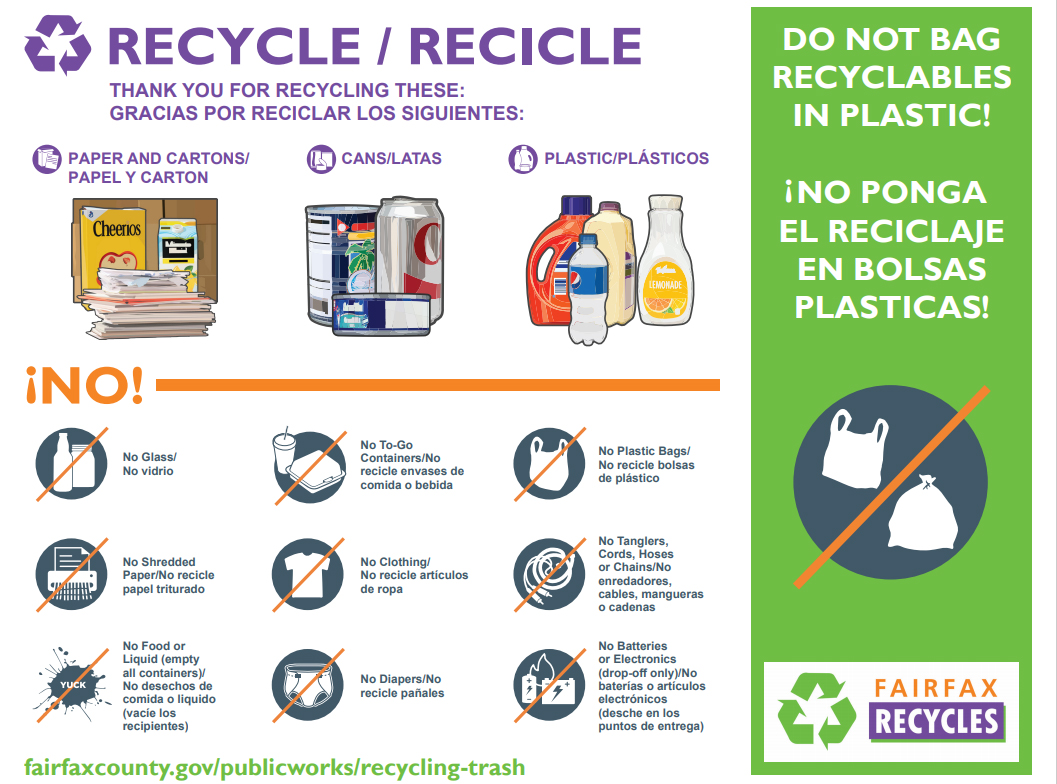Trash and Recycling Notice:
Temporary Operation Changes: I-66 and I-95 | Trash and Recycling Facilities Customer Survey | Residential Disposal Fees Update

Reduce, Reuse, Recycle
Disposal and Recycling Guidelines:
Must be free of most dirt. Stumps can be taken to the I-66 Transfer Station or I-95 Landfill Complex for disposal.
Temporary Operation Changes: I-66 and I-95 | Trash and Recycling Facilities Customer Survey | Residential Disposal Fees Update
Keeping communities clean and healthy. The curbside recycling bin program is designed to collect specific materials. Click on the link at right to open the flyer which will tell you which items you can always place in your curbside recycling bin and which you cannot.
Download the flyer for more information.
You can recycle glass in Fairfax County, just not in your curbside recycling bin. Glass placed in a purple container is recycled into new materials in as little as 30 days.
Plastic bags get wrapped around the rollers and stop the conveyor belt. Workers then remove the bags by hand. Plastic bags that make it past the rollers contaminate the other recyclable materials. Please take bags back to the grocery store, place them in the trash, or choose reusable bags
Source reduction is the first goal of sustainability; then reuse. Recycling is last. Try to reduce waste in the first place, or reuse items before recycling. Give unwanted or unneeded clothing, household goods, books, etc. a second life by donating them to worthy causes. Reducing waste by repurposing unwanted but usable goods is an important part of the Fairfax County Environmental Vision.
 Recycle
RecycleYou should be able to recycle everywhere you go - at home, at work, and at play. If you are concerned that there is no recycling available at a location you frequent, call us at 703-324-5230.
View The Environmental Protection Agency's (EPA) answers to some of the most common recycling questions at EPA's Frequent Questions on Recycling.
Fairfax County has rules regarding how waste and recycling is managed. One important component of the county’s solid waste ordinance is the requirement for residents to separate recyclables from trash for placement at the curb for collection. Both waste and recyclables are required to be collected weekly if you receive collection service at your residence.
Did you ever wonder where your recycling materials go? Follow the journey with this flowchart. Click the picture to download for easy viewing.
Join Fairfax County staff on their visit to a local Materials Recovery Facility.
Trucks unload recyclables onto a tipping floor, where materials are fed into a conveyor belt for sorting.
Workers manually remove large or contaminating items from the conveyor belt.
Screens separate cardboard and paper from smaller items and glass particles.
A magnet extracts ferrous metals like steel cans from the material stream.
Optical sorters identify and separate specific plastics and cartons using light detection.
An eddy current separator repels aluminum and other nonferrous metals from the stream.
Glass is removed early to prevent damage to equipment and contamination, with special recycling containers available for proper disposal.
Find phone numbers, hours, addresses, and disposal fees for the I-66 Transfer Station and the I-95 Landfill Complex.
Waste cooking oil is accepted every day at the I-66 Transfer Station or the I-95 Landfill Complex. Take cooking oil directly to the Household Hazardous Waste facility for recycling!

Consider composting, nature’s own way of recycling. Composting is the controlled breakdown of organic material such as yard waste or food scraps. You can buy a compost bin or make one yourself.
The Fairfax County Household Hazardous Waste Program accepts hazardous materials from residents free of charge and disposes or recycles them according to all local, state and federal regulations.
The I-95 Energy Resource Recovery Facility (E/RRF) located at the county’s I-95 Solid Waste Management Complex in Lorton is owned and operated by Reworld Fairfax, Inc. (CFI). Municipal solid waste (MSW) serves as the fuel for the facility, which is designed and operated in a similar manner to a typical power plant. Steam is produced from the combustion of MSW, and is used to spin turbine-generators that produce over 80MW of electricity.
For the latest county trash and recycling metrics, visit Waste Metrics | Office of Environmental and Energy Coordination.
